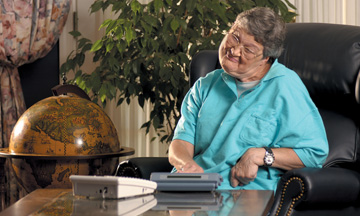STS (Speech-To-Speech)
People who have mild to moderate speaking difficulties—and can hear
clearly on the phone—can use Maryland Relay’s Speech-to-Speech (or STS)
service to stay connected. STS is ideal for, but not limited to, anyone
living with:
- Cerebral palsy
- Multiple sclerosis
- Muscular dystrophy
- Parkinson’s disease
- Stroke
- Stuttering
- Traumatic brain injury
- Laryngectomy
How It Works
- The STS user speaks with his/her own voice, voice synthesizer, voice enhancer, or other assistive device.
- A Maryland Relay Operator listens to everything the STS user says and re-voices it, as needed, to the other person.
- As that person responds, the STS user listens directly to what is said.
To Make an STS Call
- Dial 7-1-1 or 800-785-5630.
- A Maryland Relay Operator will greet you and provide his/her Operator identification number.
- Tell the Operator that you’d like to make a “Speech-to-Speech” or “STS” call. (You can also set up a Customer Profile, which automatically connects you to the appropriate Operator and lets him/her know your calling preferences.)
- Tell the Maryland Relay Operator the number you wish to call, along with any additional calling instructions if needed.
- You will then be asked if you wish for the Operator to revoice
everything you say, or just when speech is difficult to understand. You
control the Operator’s role during your call. You can instruct the
Operator to intervene upon request from you or the other person. You can
also ask the Operator to mute your voice, if desired.
To learn more about placing and receiving STS calls, please call our
STS User Training Line at 866-269-9006 (English) or 866-744-7471
(Spanish).
Visually Assisted STS
With Visually Assisted STS, Maryland Relay Operators use speech and
visual cues to facilitate conversations for STS users via a live video
connection. Learn more about Visually Assisted STS.
Apply for Assistive Equipment Provided by the State
Assistive telecommunications devices are available through the
Maryland Accessible Telecommunications (MAT) program for qualified
Maryland residents. Learn more about the MAT program.
